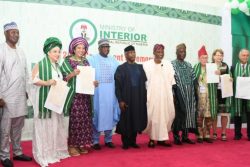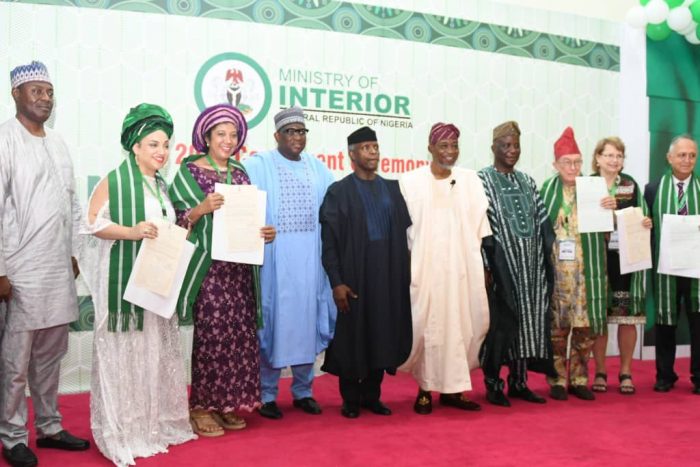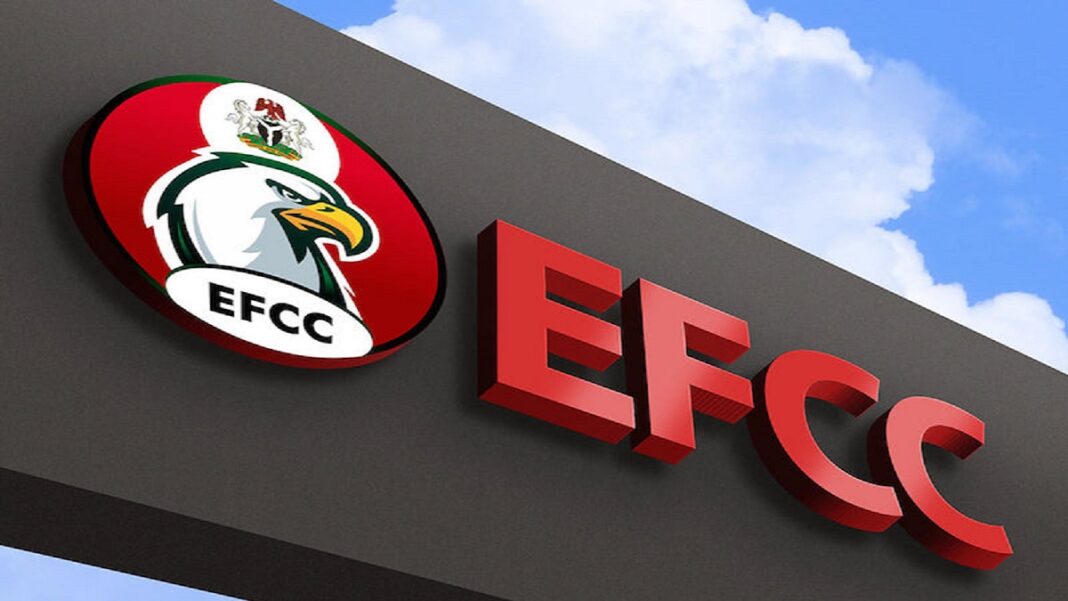Chukwuemeka Uwanaka
“I am still not pleased with this figure. In Europe and America, thousands of foreigners are inducted into citizenship every year. They do this to attract youths and people in their prime who would like to contribute to the development of their countries. Let’s face it. There is a limit to your expectations from a non-citizen and it is reasonable to expect an average person to be more loyal to his or her country.
The bane of the smooth pathway to Nigerian citizenship however is the constitutional requirement of continuous residency in Nigeria for 15 years. This is a huge disincentive, considering that in the United States and most European countries, it is five years. Some of these countries have made a habit of snatching young and resourceful brains – who after four years of schooling and working for just one year – through easy pathways, to obtain quality migration to their countries.”


The above quote, which are excerpts from the speech by Rauf Adesoji Aregbesola, Nigeria’s immediate past minister of interior, at the citizenship conferment ceremony for 385 people, on May 27, 2023, could signify a major policy shift by the Nigerian government, in the realisation of the critical role that diversity in human capital plays in meeting its development aspirations in a globally competitive and increasingly globalised world.
Coming from a senior official with conservative leanings at the tail-end of an administration that did not have diversity management as one of its strong points, this policy drift could also represent a more fundamental comprehension of the role that human capital and intelligence plays in the 21st century and fourth industrial revolution, which every globally competitive country is conscious of, and has been actively participating in. In an increasingly globalised fourth industrial revolution world, competition for the best human capital and talent has indeed, become a fierce battle.
The Nigerian policy drift and response have been the ‘Brown Card’ initiative, announced by Aregbesola at the May 2023 conferment ceremony. But more on the brown card later. Research has identified human capital as the most important factor in development. Diversity in human capital has also been identified as a factor that enhances high performance among groups, though diversity can sometimes be challenging to manage.
Indeed, the most developed countries of the world have policies and schemes that support the migration of good talent from every part of the world. The United States, which is the largest economy in the world, and also leads in military strength, science and technology with its current population of 332 million, has adopted various migration schemes to attain and retain its global dominance. ‘Operation Paperclip’ is an example of a migration program that the US has used to attain and retain its global economic and technological dominance. The programme was a secret government operation between 1945 and 1959, whereby over 1,600 German scientists, engineers, and technicians were taken from former Nazi Germany to the U.S. for government employment after the end of World War II in Europe. By 1947, this migration program had netted an estimated 1,800 technicians and scientists, and 3,700 family members from Germany to the US.
Among those moved by this program to the US was Wernher von Braun, who was the chief architect of the Saturn V launch vehicle, which enabled human missions to the moon. He is also one of the most acclaimed heroes of the success of the National Aeronautics and Space Administration (NASA), and the numerous benefits of NASA to science, communications technology and other forms of technology. Other critical persons that the US harnessed from this program were Adolf Busemann, who was responsible for the swept wing that improved aircraft performance at high speeds; Herbert A. Wagner, the inventor of the Hs 293 missile; and other engineers on the Osenberg List that developed the V-2 rocket.
Alongside policies in centuries past that encouraged Jewish migration, which explains some of the Jewish ancestries of many contemporary global tech founders such as Facebook and Google, the US has, in recent decades and more contemporary times, used a number of policies to ensure that they attract top talent to support its global economic and technological lead. They include the Diversity Immigrant Visa Program (Green Card Lottery) and H-1B Visa for highly skilled workers which has encouraged many Asian techies to migrate, work and contribute to the development of the US tech sector.
Recent US legislations such as the CHIPS Act and Inflation Reduction Act potentially encourage the migration and retention of top tech and renewable energy specialists to the US. Immigrants and those with migrant backgrounds played key roles in the development of COVID-19 vaccines in the US, as immigrants constitute nearly 25% of all workers in pharmaceutical and medicine manufacturing, as well as more than 25% of all physicians in the country. The powerful US military is also a diverse organisation, as 41% of the military identify as members of minority groups.
The United Kingdom (UK) has a good healthcare system characterised by a life expectancy of 81 years and is a medical tourism destination for the Nigerian elite. The UK’s much-prided National Health Service (NHS) has staff from over 200 different nationalities. Though a 74.4% majority white British country, out of NHS staff whose ethnicity was known, 74.3% are white and 25.7% are from ethnic minority groups. The situation gets more interesting in some of the higher-skilled cadres. While ethnic minority staff make up 49.9% of hospital and community health services (HCHS) doctors, Asian staff made up the highest percentage of HCHS doctors working in staff grade, speciality doctor, and associate specialist positions.
Promoting international diversity for national technological and economic advantage is not a Western-only strategy. The Russia-led Union of Soviet Socialist Republics (USSR) organised its own version of Operation Paperclip in October 1946. Under the programme known as ‘Operation Osoaviakhim’ over 2,500 Nazi German scientists, engineers and technicians, as well as about 4,000 of their family members, were moved to the Soviet Union. The skilled workers contributed to the development of the science, technology and defence industry of the Soviet Union as the Cold War was commencing.
What therefore becomes obvious from the examples of these developed countries that Nigeria seeks collaboration and assistance from in the areas of science, technology and the economy, are countries that purposely encourage organised migration and retention of diversely skilled persons into their countries to enable them to enhance and sustain their dominance in critical sectors.
It is therefore within this context of intense global competition for top and diverse human capital by competitive countries that the potential of the Nigerian Brown Card can be situated. With the Brown Card, which is a legal instrument for permanent residency, the Nigerian minister of interior is now invested with the authority to confer permanent residency on non-Nigerian persons, enabling beneficiaries to reside and work in Nigeria without the requirement of renewal every five years, as was the case. It also reduces naturalisation from 15 years to five years.
The eligibility includes foreign nationals of African descent who desire to make Nigeria their homeland through the ‘Privilege of Return’; foreign nationals who desire to invest in Nigeria in line with established guidelines; foreign nationals who had demonstrated exceptional talents, knowledge and skills in rare fields of science, technology, medicine, engineering, the arts, sports and other areas as might be determined from time to time; and male foreign nationals married to Nigerian women for a minimum period of one year.
Given the examples of many developed countries, it can be argued that the lack of a strategic migration policy to attract skilled human capital from different parts of the world may be a major part of the missing link in some of Nigeria’s development shortcomings as a lot of grand plans and projects we aim for in science, technology and the economy, comes with international diversity, not expatriates. Indeed, most signature infrastructure projects in Nigeria were built by international companies and personnel, but such foreign personnel were largely unable to remain in Nigeria due to the lack of appropriate migration retention policies.
As globalisation has involuntarily imposed global competition on Nigeria, Nigeria’s ability to strategically compete is therefore influenced by the availability of appropriate policies to attract and retain the best human capital, hence the importance of the Brown Card.
Nigeria has a huge science, technology, infrastructure and human capital gap. As a country, it also seeks significant foreign investment. The amount of time and commitment required by people who can contribute to these needs a change of approach for more competitiveness. That is why certain countries also provide residency based on the value of investment or skills, as there is a limit to what someone on a guest visa can provide.
While 80% of Nigerian firms are experiencing a technology skills gap due to the migration of workers, 58% of decision-makers in the information technology sector identify the lack of skilled human resources with digital skills as one of their main business threats. Countries such as the UK also face skill gaps in certain sectors such as healthcare with British doctors migrating to Canada, New Zealand and Australia. The UK government’s comprehension of global competitiveness however means that short-term measures are applied, such as encouraging migration of qualified medical personnel from other countries to the UK, while medium-to-long-term measures evolve.
When the historical contributions of Israelis in agriculture and infrastructure, the British to commerce, Germans to infrastructure and Indians to education and commerce in Nigeria are considered, these communities should have had larger communities in Nigeria after decades. Rather, the numbers keep shrinking relative to the total population. When this is considered, alongside the peculiarities of the skilled human capital situation in Nigeria where skilled Nigerian workers continue to migrate to other countries, it makes strategic sense for the minister of interior to be allowed some discretion in retroactive application of Brown Card approval.
To support the development of infrastructure, the skilled foreign workers of German companies such as Julius Berger and Strabag, Reynolds Construction of Switzerland and a few other Israeli companies who previously worked in Nigeria, should have the previous number of years they have resided and worked in Nigeria considered in retroactively granting them the Nigerian Brown Card. That way, they are able to return and contribute efficiently to the development of much-needed infrastructure as they have accumulated a lot of knowledge about Nigeria. There could also be a provision that will have them become faculty in the engineering, architecture, agriculture and urban planning departments of Nigerian universities for sustainable knowledge transfer.
Similar retroactive Brown Card approvals should also be granted to former foreign and present workers in the petroleum industry, which has been the mainstay of the Nigerian economy for decades. In Nigeria, the major petroleum projects have largely been joint ventures (JV) with foreign firms and personnel such as Shell, Exxon-Mobil, Agip, Total and Halliburton playing key technological roles, while the Nigerian government earns royalty. The JV approach is also because Nigeria largely lacks the technology to explore and prospect oil fields. Efficient citizenship pathways should be applied retroactively to previous workers, who may have returned to their home countries but still have an affinity for Nigeria. This category of workers may find such an offer attractive, as their employment prospects may be constrained due to overall divestment from carbon-heavy industries in their home countries.
About 20,000 Nigerians travel to India annually for medical reasons, spending about $260 million in 2019. If medical tourism from Nigeria to India is this high, the rationale therefore exists to allow certified Indian hospitals and Indian medical personnel who establish healthcare facilities in Nigeria, to become naturalised Nigerians in a short while. A lot of the existing policy panacea for Nigeria’s healthcare is medium to long-term, but every responsible and globally competitive country will need short-term and speedy solutions as well, such as migration.
The People’s Republic of China has become more involved in the provision of space satellites, roads, railways, seaports, airports, fintech and other major sectors of Nigeria. As many Chinese are increasingly interested in migration and permanent residence in other countries, there is a strategic opportunity for Nigeria to attract and retain Chinese who can be a strategic fit in Nigeria’s human capital needs. That could subsequently lead to a reduction in Nigeria’s debt commitments if well managed, as some of the cost that goes into acquiring Chinese space technology and infrastructure can be reduced, with naturalised Nigerians of Chinese origin providing critical services in-situ.
While not downplaying the enormous negative cost of colonialism, apartheid and racism, the ‘rainbow nation’ philosophy of Archbishop Desmond Tutu which was adopted by Nelson Mandela as president of South Africa, led to the retention of white, Chinese and Asian human capital who may have fled from South Africa at the end of the apartheid government. The retention of non-black human capital contributes to South Africa having some of the best infrastructure, healthcare and economy in Africa.
When compared to some of the radical policies in Zimbabwe after apartheid which encouraged the exit of many non-black Zimbabweans, and the radical policies in East Africa post-independence that led to the exit of many Indians, then the advantages of diversity management become more pronounced. Rishi Sunak, the current UK prime minister with a Kenyan-born father and Tanzanian-born mother (both of Indian origin) who migrated to the UK and became medical professionals, is a potential example of Africa’s loss to the UK due to poor diversity retention policies. The same comparison can also be done, between the Franco-African policy approach of President Félix Houphouët-Boigny of Cote d’Ivoire that led to the retention of French human and economic capital after independence in 1960, and some other Francophone African countries that adopted more radical approaches at independence.
The Nigerian Brown Card should hopefully see in future, naturalised Nigerians of Indian descent sent as Nigeria’s ambassador to India, naturalised Nigerians of Israeli descent sent as Nigeria’s ambassador to Israel, naturalised Nigerian of British descent sent as Nigeria’s ambassador to the UK, among others. Such an approach has contributed to successful diplomacy by the US and some other countries. If done, the Brown Card would have become a successful foreign policy tool, in addition to science, technology and economics.
This policy approach does not stop the Africa and concentric focus of Nigeria’s foreign policy, neither is it assumed that increased diversity is easy to manage. However, greater consciousness of the envisaged benefits of this policy can nudge and influence social behaviour in a manner that is helpful. It can be argued that more international diversity may even help Nigeria in managing its elaborate internal diversity better, though with naturalisation, not an expatriate approach. While the former is inclusive, the latter can be segregating. Nigerians have over time demonstrated the ability to adopt and accept policies that are beneficial. Also, the large and increasing Nigerian diaspora population, as well as the economic benefits of diasporas to their families in Nigeria, is an indication that many Nigerians are very conscious of the importance of the global movement of people.
An additional economic benefit is that naturalised Nigerians will earn their living in naira, which reduces the cost and macroeconomic pressures that come will paying the same people in foreign exchange. Also, the prospects of long-term foreign direct investment can be enhanced if investors know that they can acquire the required residency status to justify their long-term investment.
Critics may question why skilled foreign personnel may choose to migrate to Nigeria, given its current socioeconomic challenges. There is however some allure for Nigeria by current and former foreign workers. Perhaps also, the consciousness by the government about the infrastructure and social services that are needed to attract and retain top human capital may make the government more effective and efficient in providing security, town planning, education, and municipal services to all and every part of Nigeria. And population is not a factor as the US with a population of 332 million, which is more than Nigeria’s population of 200 million, continues to encourage migration. Canada and Australia are examples of other developed countries that encourage skilled migration in hundreds of thousands annually.
As someone who some people sometimes question his ‘revolutionary’ approach to governance, attitude to sub-nationalism and culture, his handling of faith, and who occasionally displays ‘big-energy’ bursts that belies his age, Aregbesola may have initiated a policy that projects Nigeria as a ‘symbol’ of Africa’s renaissance, similar to Renascent Africa envisaged by the late sage, Nnamdi Azikiwe (Zik of Africa). His public service experience which includes a stint as governor of Osun state, and commissioner in Lagos state, can lead to questions on why he left the brown card policy so late to the end of the previous administration, given that new administrations can discontinue with infant policies. Did the creative juices from his engineering background kick in after some exposure to national governance? Or was it a last-minute moment of inspiration? Well, we may never know what caused these, if any.
And for conservatives who may think that Aregbesola flew too fast with this policy that makes Nigeria more diverse, it may be because he is from the land of decorated fighter pilots and ex-Air Force Chiefs, Air Chief Marshal Oluseyi Petinrin and Air Marshal Isiaka Amao. But I digress.
The Nigeria Brown Card, which improves the citizenship pathway and human capital in Nigeria, is a policy that can be properly assessed in the medium to long term. If it delivers on its development objectives for Nigeria in human capital, technology advances, medical improvement, infrastructure and agriculture development, and long-term foreign investment inflow, then Aregbesola may have contributed in ways larger than expected– perhaps as the symbol, towards the full actualisation of the development aspiration of Africa’s most populous country.
- Uwanaka writes from African University of Science and Technology, Abuja. He can be reached [email protected]











